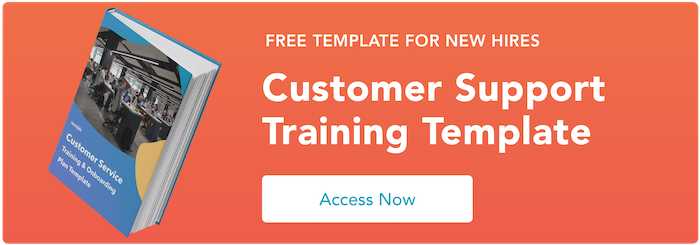I Am So Happy
Let's be clear. At that place'due south goose egg incorrect with proverb, "I'd exist more happy to help." In fact, when I worked on the HubSpot customer support team, I would utilize this phrase frequently because I thought it was a courteous way of letting customers know that I was eager and willing to assist them. But, the more that you lot use this phrase, the more that you lot tend to lean on it in your twenty-four hour period-to-mean solar day vocabulary. I defenseless myself saying this all of the time to the indicate where I felt I was overusing it and sounding like a broken record. Every time a client asked me to do something, I would immediately bark back with, "I'd be more than happy to help," like a trained canis familiaris. This wasn't an issue if the call was brief, or if the customer had an easy question. Only, when I had to work with people who needed help with multiple problems, this phrase would gradually feel less sincere as I continued to utilise information technology. Later on the second or third time saying it on a call, customers would remember that I was just trying to movement the conversation along and that I didn't genuinely intendance about their issue. Somewhen, I learned that using an alternative phrase non only made me feel similar I wasn't repeating myself, but it too made the quality of my service more consistent for my customers. By using different vocabulary and phrases, it kept conversations fresh which showed customers that I was yet invested in their bug — even if the call was long. In this mail, we've curated a listing of alternatives to the phrase, "happy to help." Share these with your squad to improve their advice skills and provide a better service experience for your customers. Information technology's a pocket-sized change, but switching the give-and-take, "happy" with the discussion, "love" makes a big difference in this example. You lot're not just excited to collaborate with the client, rather, yous're eager to assist and are motivated past their success. If you lot want to be brief, you tin use this phrase when a client asks for your help. It's a quick response that shows the client you've listened to their problem and you're ready to provide back up. This is a great phrase to apply if the customer is in a bustle and wants to get a solution as fast as possible. This is a good phrase to use when a customer seems frustrated or stressed about a problem. Information technology shows them that you're confident in your power to troubleshoot and it neutralizes the overwhelming feelings that the client may have. If you're looking for a more than casual approach, this phrase is great because it empowers the customer to ask for assist. Information technology tells them that you're able to provide any they need and that they can rely on you lot for continued support. I'd recommend using this phrase if you've already developed a rapport with your customer and they don't expect you to exist every bit formal as you offset were on the phone call. Be conscientious when you utilise this one. While it's a neat culling to "happy to help," some people may think you're non taking their issue seriously enough. They may think that they have a existent problem on their easily, and by telling them otherwise, you may add friction to the service experience. Information technology'south best to use this phrase when the customer asks yous to do something small like looking up a knowledge base article or directing them to their customer success manager. Since these are relatively piece of cake tasks, nigh customers won't call up twice when you use this phrase. I like to use this phrase when I'm signing off an email or wrapping up a phone call. Information technology lets the customer know that I'grand always available to assist and they shouldn't worry about contacting me outside my working hours. It likewise shows the customer that I'm aligned with their needs and that their solutions won't come up at the expense of my personal convenience. While information technology's not for every support team, it may make sense to use this phrase if your customers are expecting a formal service interaction — similar at a high-end hotel or a fancy restaurant. As a service rep, this keeps your communication on brand which makes the customer feel like they're interacting with a luxurious company. In most scenarios, this phrase tin can be used interchangeably with "happy to assistance." It finer sends the same bulletin, merely uses different linguistic communication like "help" instead of "assistance." This is a good phrase to keep in your back pocket if you suddenly freeze with the customer and aren't sure how to respond. Now that you know what to say to customers, acquire which customer service phrases to avoid. ![→ Download Now: Customer Support Training Template [Free Template]](https://no-cache.hubspot.com/cta/default/53/78097403-61d1-4855-9aa4-90c3cba6d94b.png)
Alternatives for 'Happy to Help'
1. "I'd dear to assist."
two. "Certainly."
3. "It would be my pleasance."
4. "You got it."
5. "Not a problem."
vi. "Please don't hesitate to achieve out."
seven. "At your service."
8. "I'd be more than willing to assist."


Originally published Feb 19, 2021 viii:15:00 AM, updated June 15 2021
clelanddessitheigh78.blogspot.com
Source: https://blog.hubspot.com/service/happy-to-help